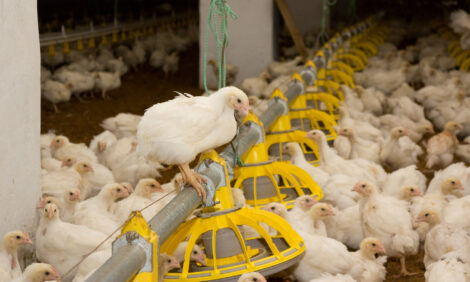



Weekly Review: Avian Influenza Outbreaks in US Cause Concern
ANALYSIS - Outbreaks of highly pathogenic avian influenza in the US are causing concern for the US poultry sector and the poultry market in general.One of the major concerns is that these outbreaks of the H5N2 subtype are being found in flocks of birds on the Pacific and Mississippi flyways – the route taken by migratory birds.
Last week an outbreak was reported on a turkey farm in Minnesota and this week on two farms in Missouri.
The United States Department of Agriculture’s (USDA) Animal and Plant Health Inspection Service (APHIS) confirmed the presence of highly pathogenic H5N2 avian influenza in a commercial turkey flock in Pope County, Minnesota.
This is the first finding in the Mississippi flyway. It is the same strain of avian influenza that has been confirmed in backyard and wild birds in Washington, Oregon and Idaho as part of the ongoing incident in the Pacific flyway.
APHIS also confirmed the presence of highly pathogenic H5N2 avian influenza (HPAI) in two separate commercial turkey flocks in Missouri, located in Jasper County and Moniteau County, within the Mississippi flyway where this strain of avian influenza has previously been identified.
CDC said that the risk to people from these HPAI H5 infections in wild birds, backyard flocks and commercial poultry is low.
Samples from the turkey flocks, which experienced increased mortality, were tested at the Missouri Department of Agriculture Veterinary Diagnostic Laboratory and the APHIS National Veterinary Services Laboratories in Ames, Iowa confirmed the findings.
APHIS is working closely with the Missouri Department of Agriculture on a joint incident response. State officials quarantined the affected premises and the remaining birds on the properties will be depopulated to prevent the spread of the disease.
Birds from the involved flocks will not enter the food system. No human infections with these viruses have been detected at this time.
Market analysts Dr Steve Meyer of Paragon Economics and Len Steiner of Steiner consulting, said the two cases in Missouri are a cause of "major concern" for the poultry industry, but things are not critical yet as action has been taken swiftly and to date the outbreaks have been restricted to turkey flocks.
However, the animal health and nutrition company Diamond V warned that overlapping migratory waterfowl flyways are spreading highly pathogenic avian flu eastwards in the United States.
High vigilance and biosecurity are slowing the advance of high pathogen avian influenza (HPAI) from north western North America. However, overlapping migratory waterfowl flyways are spreading the disease east.
Geese, ducks, and other waterfowl that fly over or land in areas with high concentrations of backyard poultry represent high-risk for the spread of HPAI. Migratory flyways overlap, so Pacific Flyway birds can pass HPAI to those travelling the Mississippi Flyway and so across the continent.
Diamond V poultry veterinarian, Dr Eric Gingerich, explained: “Turkeys can provide early warning of the spread of HPAI. It takes about 100 times more virus to infect chickens than turkeys.”
In other avian influenza incidence around the world, the World Organisation for Animal Health (OIE) confirmed there have been a total of 65 new outbreaks of H5N8 highly pathogenic avian influenza in South Korea, affecting almost 2.6 million birds.
The veterinary authority reports 22 outbreaks clusters of highly pathogenic avian flu covering 65 individual outbreaks, mainly in the western half of the country but also affecting city areas in the south-east.
All the outbreaks, which started between September 2014 and the end of January 2015, were in domestic poultry - chickens, ducks or both.
Ten poultry farms in Bauchi state in Nigeria have also been confirmed to have been affected with avian influenza, according to the Ministry of Animal Resources and Nomadic Resettlement.








